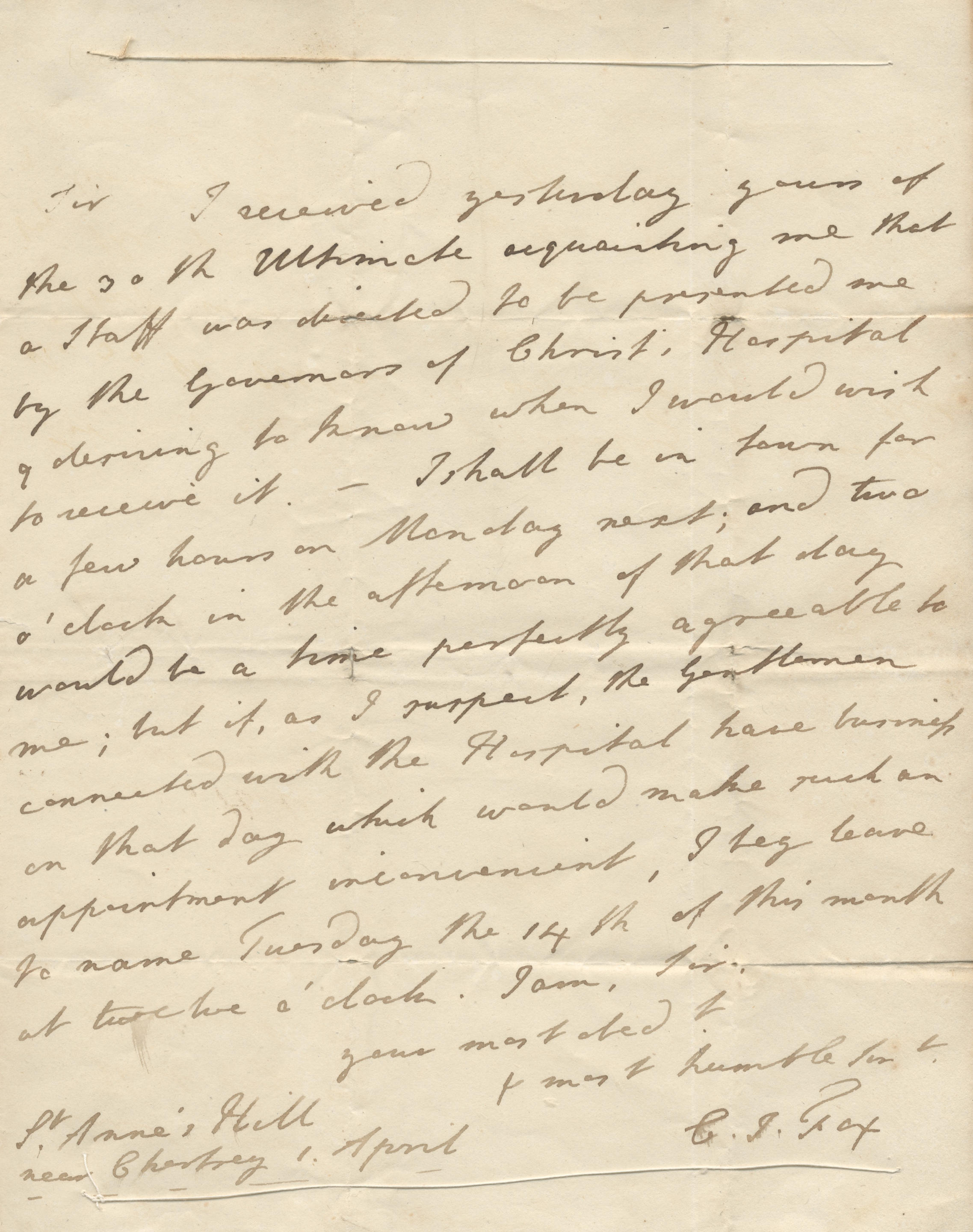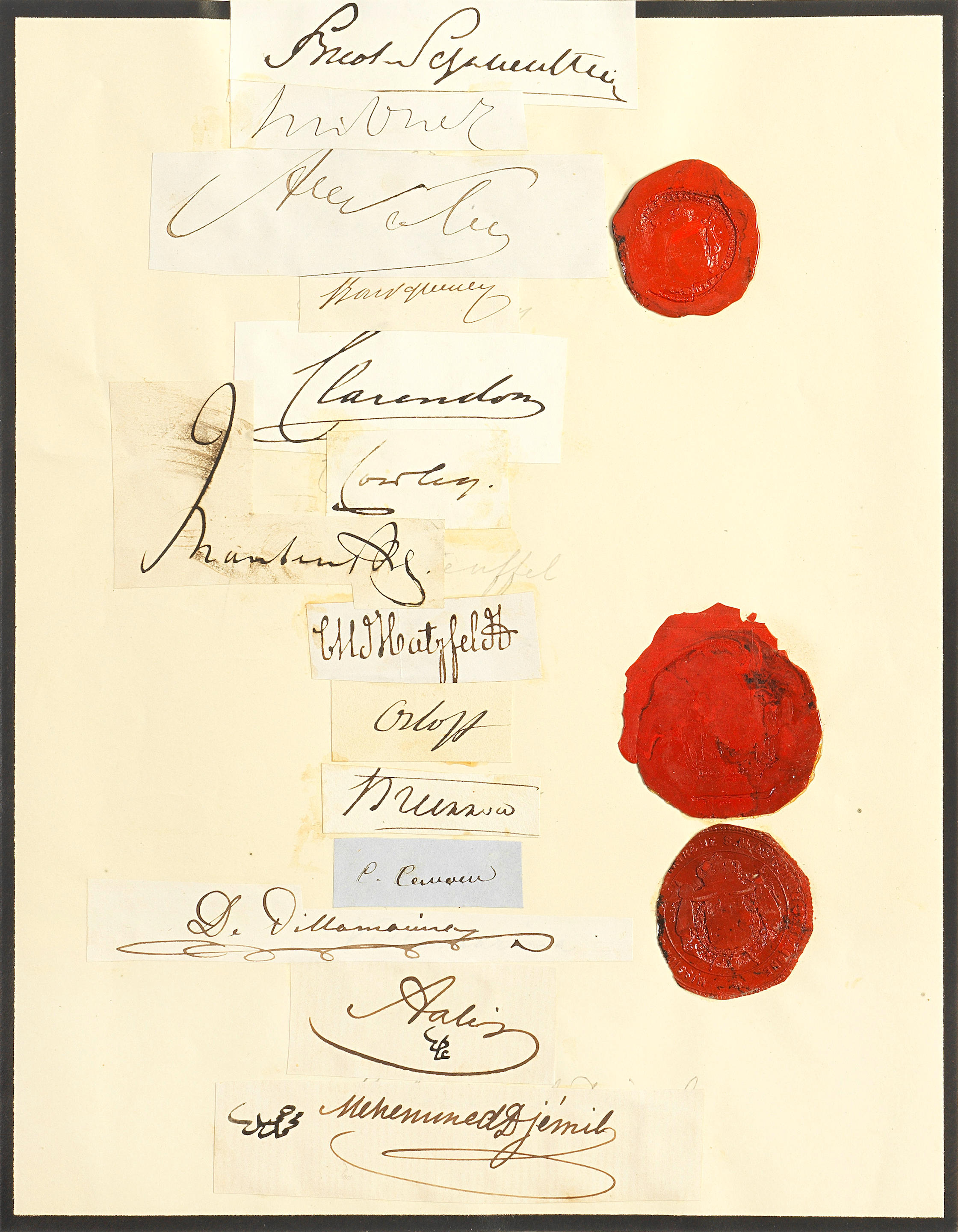Florence Nightingale
Collection of autograph letters signed, mostly addressed to her godson "Malcolm" (Ian Malcolm Bonham-Carter), plus inscribed book and ephemera
i. 18 autograph letters signed, mostly addressed to her godson "Malcolm", dated between August 27 1882 and January 10 1902, some early letters addressed to Malcolm's father or mother, 3 letters on mourning stationery, some in postmarked envelopes, some on paper headed "10 South Street, Park Lane, W", light staining and wear at folds, wear to envelopes;
ii. A picture book presented to Malcolm. J.H. Ewing–R. Andre (illustrator). Mother’s Birthday Review. London: Society for promoting Christian Knowledge, [n.d.].Oblong 8vo, warmly inscribed by Nightingale on front free endpaper: “For Godmother Florence’s little God son Malcolm Bonham-Carter, with her love – Twelfth Night 1886” (initially in pencil, overwritten in ink), 32pp, original pictorial boards, pink edges, spotting and browning, texblock becoming loose, backstrip split at upper joint;
iii. Telegraph, addressed to Malcolm, thanking "you and mother for beautiful basket of ferns and heath", wear at extremities;
iv. Related ephemera, including Christmas cards/card slips inscribed from Florence Nightingale to Malcolm, dated 1882, 1888, 1893, 1894, 1897, 1898, inscribed but undated New Year's card, 2 further blank Christmas cards, loose cutting from Daily Telegraph article discussing Nightingale's time in Scutari during the Crimean War;
housed in a contemporary calf box, 215 x 255 x 105mm., with Ian Malcolm Bonham-Carter's initials stamped to lid, wear to box, handle splitting
An intimate series of letters from the founder of modern nursing to her godson, Ian Malcolm Bonham-Carter (1882-1953), revealing Nightingale's strong commitment to the role of godmother during the latter portion of her life.
In the earliest letter, written just four weeks after Malcolm's birth, by which point Nightingale was in her early sixties, she informs his father (Lt. Col Hugh Bonham-Carter, 1832-1896) that she will "gladly accept" the role of godmother "for your & Laurie's child", having previously "declined the office [...] for some of my nearest friends", perhaps because her ongoing involvement in political, imperial, and public health projects precluded such a commitment. Indeed, she excuses the brevity of her note, admitting that she has lately been "overworked with the nursing arrangements for the Expedition to Egypt" (i.e. the Anglo-Egyptian War of July-September 1882). This is the only letter in the series to touch on subjects other than her relationship with Malcolm and his family. In it she reflects prevailing imperialist attitudes when she expresses her "joy for Ben's safe return" whilst at the same time she "grudges such a waste of heroism and energy: where he might spend it on Central Africa or somewhere where there are a million of human beings to raise & civilise".
The other letters show Nightingale's religiously charged devotion to the office of godparent, whilst also revealing something of the mutual affection held between godmother and godson. At various points, she promises to furnish him with morally improving literature (as with the picture book included in this lot), and she praises her "little godson Thomas for getting and framing the scripture print for Malcolm" (31 July 1889). Elsewhere, she thanks Malcolm for sending her gifts—generally flowers, but even, at one point, a set of "splendid scarlet garments which in the sun look truly like regal robes" (2 January 1898). She reminisces fondly about his visits, and several letters implore him to call upon her in-person at her Park Lane address, with the envelope of a letter of 20 January 1898 inscribed "a verbal answer, please".
A moving series of three letters, composed on mourning stationery, and addressed variously to Malcolm and his mother Laurie between 16 December 1896 and 4 January 1897 express tender sympathy in the immediate aftermath of Hugh's death, whilst imploring fourteen-year-old Malcolm to assume the role of man of the house: "Dearest Malcolm, you and I would have like to have talked yesterday about the dear father you have lost — But I felt it was too soon [...] But you will say that it is not too soon to talk of what would please him that you should do. Will it not please him that you should take care of little Clare [...a]nd help Thomas" (4 January).
Nightingale's tone towards Malcolm throughout his adolescence is often rather doting. She takes delight in giving him little presents of money ("I omitted today the most important ceremony of tipping a young man returning to the seat of learning", 20 January 1898), fusses over whether he will be safe on his new bicycle—urging him to remember that "a Bicycle can be as unruly as a pony" (6 January 1899)—and takes pride in the stellar progression of his early career in the army (31 December 1901). Physical illness was a recurrent feature throughout Nightingale's adult life, as is especially evident in the later letters through reference to her "severe cough" (2 January 1898) and "sick room" (21 November 1900). Though she would live on to the ripe old age of ninety, the later correspondence becomes increasingly brief, petering out in 1902, by which time "she could write only with great difficulty and her memory was failing" (ODNB).
Florence Nightingale
Collection of autograph letters signed, mostly addressed to her godson "Malcolm" (Ian Malcolm Bonham-Carter), plus inscribed book and ephemera
i. 18 autograph letters signed, mostly addressed to her godson "Malcolm", dated between August 27 1882 and January 10 1902, some early letters addressed to Malcolm's father or mother, 3 letters on mourning stationery, some in postmarked envelopes, some on paper headed "10 South Street, Park Lane, W", light staining and wear at folds, wear to envelopes;
ii. A picture book presented to Malcolm. J.H. Ewing–R. Andre (illustrator). Mother’s Birthday Review. London: Society for promoting Christian Knowledge, [n.d.].Oblong 8vo, warmly inscribed by Nightingale on front free endpaper: “For Godmother Florence’s little God son Malcolm Bonham-Carter, with her love – Twelfth Night 1886” (initially in pencil, overwritten in ink), 32pp, original pictorial boards, pink edges, spotting and browning, texblock becoming loose, backstrip split at upper joint;
iii. Telegraph, addressed to Malcolm, thanking "you and mother for beautiful basket of ferns and heath", wear at extremities;
iv. Related ephemera, including Christmas cards/card slips inscribed from Florence Nightingale to Malcolm, dated 1882, 1888, 1893, 1894, 1897, 1898, inscribed but undated New Year's card, 2 further blank Christmas cards, loose cutting from Daily Telegraph article discussing Nightingale's time in Scutari during the Crimean War;
housed in a contemporary calf box, 215 x 255 x 105mm., with Ian Malcolm Bonham-Carter's initials stamped to lid, wear to box, handle splitting
An intimate series of letters from the founder of modern nursing to her godson, Ian Malcolm Bonham-Carter (1882-1953), revealing Nightingale's strong commitment to the role of godmother during the latter portion of her life.
In the earliest letter, written just four weeks after Malcolm's birth, by which point Nightingale was in her early sixties, she informs his father (Lt. Col Hugh Bonham-Carter, 1832-1896) that she will "gladly accept" the role of godmother "for your & Laurie's child", having previously "declined the office [...] for some of my nearest friends", perhaps because her ongoing involvement in political, imperial, and public health projects precluded such a commitment. Indeed, she excuses the brevity of her note, admitting that she has lately been "overworked with the nursing arrangements for the Expedition to Egypt" (i.e. the Anglo-Egyptian War of July-September 1882). This is the only letter in the series to touch on subjects other than her relationship with Malcolm and his family. In it she reflects prevailing imperialist attitudes when she expresses her "joy for Ben's safe return" whilst at the same time she "grudges such a waste of heroism and energy: where he might spend it on Central Africa or somewhere where there are a million of human beings to raise & civilise".
The other letters show Nightingale's religiously charged devotion to the office of godparent, whilst also revealing something of the mutual affection held between godmother and godson. At various points, she promises to furnish him with morally improving literature (as with the picture book included in this lot), and she praises her "little godson Thomas for getting and framing the scripture print for Malcolm" (31 July 1889). Elsewhere, she thanks Malcolm for sending her gifts—generally flowers, but even, at one point, a set of "splendid scarlet garments which in the sun look truly like regal robes" (2 January 1898). She reminisces fondly about his visits, and several letters implore him to call upon her in-person at her Park Lane address, with the envelope of a letter of 20 January 1898 inscribed "a verbal answer, please".
A moving series of three letters, composed on mourning stationery, and addressed variously to Malcolm and his mother Laurie between 16 December 1896 and 4 January 1897 express tender sympathy in the immediate aftermath of Hugh's death, whilst imploring fourteen-year-old Malcolm to assume the role of man of the house: "Dearest Malcolm, you and I would have like to have talked yesterday about the dear father you have lost — But I felt it was too soon [...] But you will say that it is not too soon to talk of what would please him that you should do. Will it not please him that you should take care of little Clare [...a]nd help Thomas" (4 January).
Nightingale's tone towards Malcolm throughout his adolescence is often rather doting. She takes delight in giving him little presents of money ("I omitted today the most important ceremony of tipping a young man returning to the seat of learning", 20 January 1898), fusses over whether he will be safe on his new bicycle—urging him to remember that "a Bicycle can be as unruly as a pony" (6 January 1899)—and takes pride in the stellar progression of his early career in the army (31 December 1901). Physical illness was a recurrent feature throughout Nightingale's adult life, as is especially evident in the later letters through reference to her "severe cough" (2 January 1898) and "sick room" (21 November 1900). Though she would live on to the ripe old age of ninety, the later correspondence becomes increasingly brief, petering out in 1902, by which time "she could write only with great difficulty and her memory was failing" (ODNB).








Testen Sie LotSearch und seine Premium-Features 7 Tage - ohne Kosten!
Lassen Sie sich automatisch über neue Objekte in kommenden Auktionen benachrichtigen.
Suchauftrag anlegen